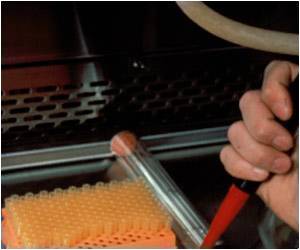Researchers have found that over-use and unwarranted use of antibiotics during late pregnancy and early development increases the risk of inflammatory bowel disease.
- Using antibiotics during late pregnancy and early nursing period increases the risk of developing inflammatory bowel disease (IBD) //
- The risk of developing IBD is higher in infants than in mothers who were treated with antibiotics
- Antibiotics used by the mother during pregnancy or early childhood of the offspring can disturb the development of the normal gut microbiome
When treated with antibiotics, lasting changes were observed in the gut microbiome of mothers, which were also passed on to their offspring. While their offspring developed the disease, an increase in IBD was not seen in the adult mice who were given antibiotics. This shows that the timing of antibiotic exposure is crucial, especially when the immune system is undergoing maturation during the early developmental period after birth .
"The newborn mice inherited a very altered, skewed population of microbes, and none of the mothers developed IBD, but even though they had the same genetic background, the offspring with an altered microbiome during this critical period of immune development became highly susceptible to the development of colitis," said Eugene B. Chang, MD, Martin Boyer Professor of Medicine at the University of Chicago, Director of the Microbiome Medicine Program of the Microbiome Center, and senior author of the study.
Chang cautioned, that pregnant women or those nursing newborn infants need not avoid antibiotics based on these results from an animal study. Antibiotics help in treating dangerous bacterial infections and should serve as a reminder to be safe from things like common cold caused by a virus. He also said that antibiotics can be used judiciously when indicated and physicians should keep in mind the importance of antimicrobial stewardship, as this study suggests that it may have long term consequences that impact health and increases risk for certain diseases.
Lasting changes that occur in the gut microbiome
Jun Miyoshi, MD, PhD, a postdoctoral scholar, and Alexandria Bobe, a graduate student in Chang's lab, designed a series of experiments to address these issues. A standard genetic mouse model for IBD was designed to study the timing of antibiotic treatment during the late pregnancy and nursing period, its impact on gut microbes and development of immune system in offspring.
None of the mother mice treated with antibiotics developed colitis. But the risk for developing colitis was higher in their pups, when compared to those pups from mothers who were not treated with antibiotics.
The team analyzed the gut microbial population structures of mothers and their offspring, using high-throughput sequencing technologies. A decrease in the diversity of bacteria was seen among the mothers and certain groups of bacteria demonstrated changes in their relative numbers. For example, there were fewer populations of Bacteroidetes and more from the phyla Firmicutes and Verrucomicrobia.
Surprisingly, these changes persisted even after stopping the antibiotic treatment, for four to eight weeks. Similar changes were also seen in the mouse pups in their gut bacteria, where the microbial communities matched their mothers at birth. The diversity of microbes in the pups were seen later in adulthood, and was found to be significantly different from that of mice not treated with antibiotics.
"When they're used during pregnancy or early childhood, they can disturb the development of a normal gut microbiome which would otherwise be essential for proper immune development. In genetically susceptible hosts, the inability to develop the immune system properly can have negative consequences like inflammatory bowel disease or any other kinds of complex immune disorders."
Researchers Working towards Reducing The Risk of Diseases
Understanding more about the microbiome in an unhealthy system helps scientists learn how to promote the development of a microbiome to live in a healthy immune system. This study showed what an 'unhealthy' microbiome exactly looks like.
"What we want to eventually develop is a microbial cocktail we can give to infants that ensures that they develop properly, metabolically and immunologically. That's going to have a significant impact on human health, by reducing risk for many types of diseases and by promoting wellness," said Chang.
Reference:
- Eugene B. Chang, MD et al. Peripartum Exposure to Antibiotics Promotes Persistent Gut Dysbiosis, Immune Imbalance, and Colitis in Genetically Prone Offspring. Cell Reports, July (2017) DOI: 10.1016/j.celrep.2017.06.060
Source-Medindia
















